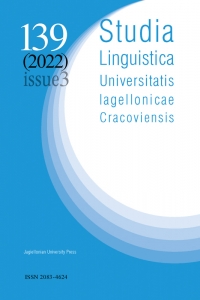On the notion of the subordinate clause in German linguistics
On the notion of the subordinate clause in German linguistics
Author(s): Agnieszka GawełSubject(s): Language studies, Syntax, Semantics, Pragmatics, Philology
Published by: Wydawnictwo Uniwersytetu Jagiellońskiego
Keywords: subordinate clause; dependent clause; German syntax; subordination; syntactic integration;
Summary/Abstract: In traditional linguistic research on German syntax the term “subordinate clause” is defined on the basis of its two distinguishing features, namely its syntactic-functional integration into the matrix, as well as its formal exponents (the presence of introductory elements and the placement of the finite verb at the end of the clause). However, this classical approach to subordination is in fact a descriptive simplification which leads to the exclusion of all reference to the scalar character of this category from syntactic description. In this paper, an alternative approach to subordination is presented through defining the dependent clause as a scalar category, encompassing a wide range of representatives differing in the degree of prototypicality. The proposed model consists of four interrelated components: a precisely defined set of integration features, type-independent general principles, a description of the type-specific clusters of integration features and the differences in the degree of integration between representatives of the same syntactic class, as well as construction-specific restrictions.
Journal: Studia Linguistica Universitatis Iagellonicae Cracoviensis
- Issue Year: 139/2022
- Issue No: 3
- Page Range: 199-215
- Page Count: 17
- Language: English

